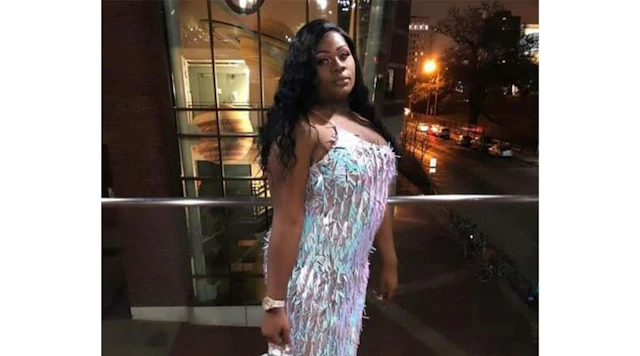
HRC Mourns Fifty Bandz, Black Trans Woman Killed in Louisiana
by Madeleine Roberts •

HRC is deeply saddened to learn of the death of Fifty Bandz, a 21-year-old Black transgender woman who was shot to death in Baton Rouge, Louisiana on January 28. Her death is at least the fifth violent death of a transgender person in 2021. We say “at least” because too often these deaths go unreported — or misreported. So far this year, four of the five known deaths have been Black transgender women.
Friends and advocates said Fifty Bandz’s name and released balloons to remember her life on February 1, and will also hold a memorial on Thursday evening. Many on Facebook have shared the sentiment “rest in peace,” with another saying “long live Fifty Bandz.” One friend shared, “When are we as a community going to do something?!”
In just one month, multiple transgender or gender non-conforming people have been killed, four of whom were Black trans women. This level of violence is infuriating and heartbreaking. This is an epidemic of violence that must be stopped. We will continue to affirm that Black Trans Lives Matter and say the names of those we have lost, including Fifty Bandz, but we must do more. Fifty was killed by someone she knew -- if we can’t trust the people we know, who can we trust? We need everyone to take action to bring this horrific violence to an end.”
According to local media reports, Fifty was killed by a man with whom she had been in a relationship for more than a year. Tragically, interpersonal violence accounts for a significant number of fatalities against transgender and gender non-conforming people. In 2020, approximately seven in ten transgender and gender non-conforming people killed as a result of fatal violence were killed by an acquaintance, friend, family member or intimate partner. Unfortunately, the relationship of the victim to the killer is still unknown for close to one-third (30%) of all known cases. This means that anywhere from 44% to 74% of victims since 2013 were violently killed by someone they knew, including intimate partners, family members, friends, peers and acquaintances.
Additionally, according to an HRC report from 2018, 54% of transgender and non-binary people have experienced some form of intimate partner violence in their life. Last year, HRC released a report, titled “LGBTQ Intimate Partner Violence and COVID-19,” that details the increased risk of interpersonal violence faced by LGBTQ people, which is exacerbated during the COVID-19 pandemic.
HRC recorded 44 deaths of transgender and gender non-conforming people in 2020, more than in any year since we began tracking this violence in 2013.
More than 10,000 hate crimes in the U.S. involve a firearm each year, which equates to more than 28 each day, according to a 2020 report from HRC, Everytown for Gun Safety Support Fund, Giffords Law Center and Equality Florida titled “Remembering and Honoring Pulse: Anti-LGBTQ Bias and Guns Are Taking Lives of Countless LGBTQ People.” The report also notes a marked increase in anti-LGBTQ hate crimes, especially against transgender people. According to the 2017-2019 Transgender Homicide Tracker, three-fourths of confirmed homicides against transgender people have involved a gun, and nearly eight in 10 homicides of Black trans women involve a gun. Further, advocates saw a 43% increase in the formation of anti-LGBTQ hate groups in 2019.
In an injustice compounding this tragedy, Fifty was misgendered in media and police reports. Anti-transgender stigma is exacerbated by callous or disrespectful treatment by some in the media, law enforcement and elected offices. According to HRC research, it is estimated that approximately three-quarters of all known victims were misgendered by the media and/or by law enforcement. In the pursuit of greater accuracy and respect, HRC offers guidelines for journalists and others who report on transgender people. HRC, Media Matters and the Trans Journalists Association have also partnered on an FAQ for reporters writing about anti-trans violence.
At the state level, transgender and gender non-conforming people in Louisiana are not explicitly protected from discrimination in employment, housing, education and public spaces. While Louisiana does include sexual orientation as a protected characteristic in its hate crimes law, it does not include gender identity. While the past few years have been marked by anti-LGBTQ attacks at all levels of government, recent weeks have seen some gains that support and affirm transgender people.
We must demand better from our elected officials and reject harmful anti-transgender legislation at the local, state and federal levels, while also considering every possible way to make ending this violence a reality. It is clear that fatal violence disproportionately affects transgender women of color, especially Black transgender women. The intersections of racism, transphobia, sexism, biphobia and homophobia conspire to deprive them of necessities to live and thrive, so we must all work together to cultivate acceptance, reject hate and end stigma for everyone in the trans and gender non-conforming community.
In order to work towards this goal and combat stigma against transgender and non-binary people, HRC has collaborated with WarnerMedia on a PSA campaign to lift up their voices and stories. Learn more and watch the PSAs here.
For more information about HRC’s transgender justice work, visit hrc.org/transgender.
- Topics:
- Transgender
Love Conquers Hate
